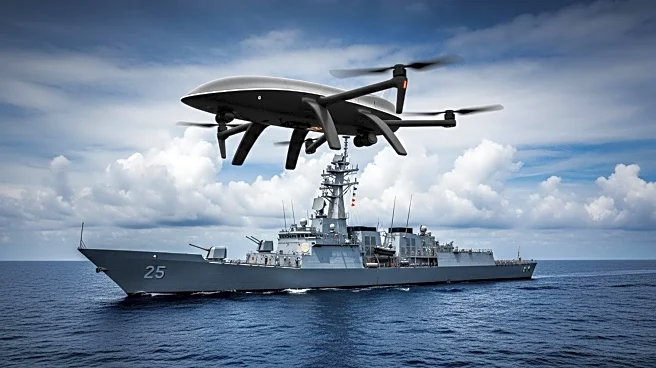What's Happening?
Venezuela has deployed warships and drones along its coastline following the United States' dispatch of three guided-missile destroyers to the region. This military buildup is part of escalating tensions between Venezuela and the U.S., with the latter aiming to curb drug trafficking activities allegedly linked to President Nicolas Maduro. Venezuela's Defense Minister Vladimir Padrino announced the deployment, emphasizing the country's readiness to patrol its territorial waters. The U.S. has accused Maduro of leading a drug cartel, prompting increased military presence in the Caribbean. Despite the heightened military activity, analysts suggest that the likelihood of direct conflict remains low.
Why It's Important?
The deployment of military assets by Venezuela and the U.S. highlights the ongoing geopolitical tensions in the region, particularly concerning drug trafficking allegations against President Maduro. This situation could affect diplomatic relations between the two countries and influence regional stability. The U.S. military presence aims to pressure Maduro's government, potentially impacting Venezuela's internal politics and its relations with neighboring countries. The situation also underscores the broader challenges of combating transnational drug trafficking, which has significant implications for regional security and international cooperation.
What's Next?
Venezuela's government may seek international support to counter U.S. military pressure, potentially involving diplomatic appeals to organizations like the United Nations. The U.S. is expected to continue its military operations in the region, focusing on drug trafficking interdiction. Both countries may engage in further diplomatic negotiations to de-escalate tensions. The situation could lead to increased military readiness and strategic planning by both nations, with potential impacts on regional alliances and security policies.
Beyond the Headlines
The military buildup in the Caribbean reflects deeper geopolitical dynamics, including the U.S.'s strategic interests in Latin America and Venezuela's efforts to assert sovereignty. The situation raises ethical questions about the use of military force in addressing drug trafficking and the potential consequences for civilian populations. Long-term implications may include shifts in regional power balances and the role of international organizations in mediating conflicts.










